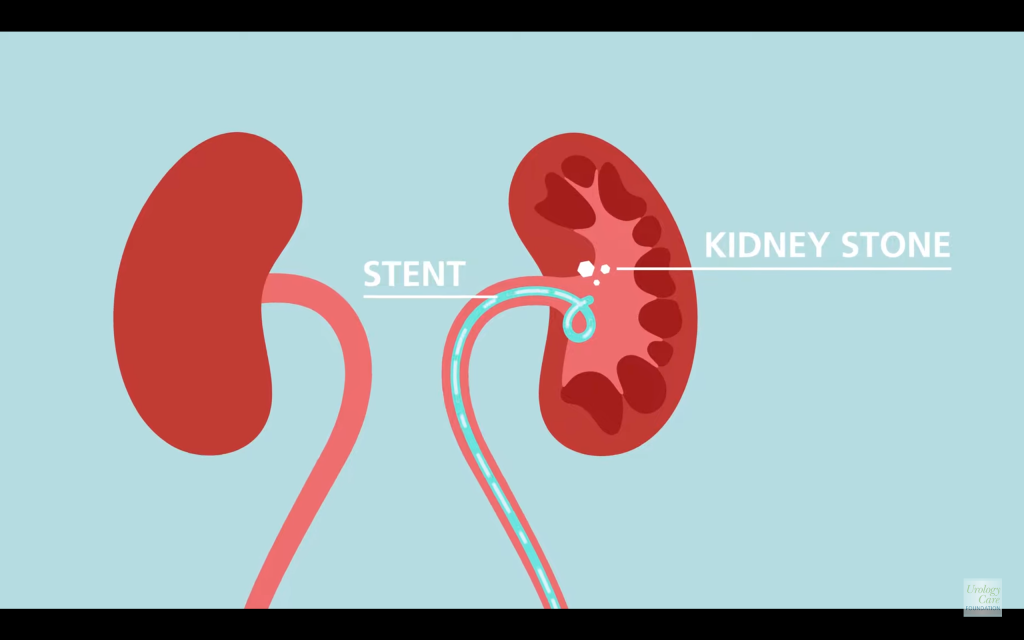In these uncertain times, battling misinformation in health information is more important than ever. Patients seek and deserve quality patient education. In this post, I present two authoritative resources—the Urology Care Foundation (UCF) and the Michigan Urological Surgery Improvement Collaborative (MUSIC)—for credible health information on kidney stones and ureteral stents.

What are kidney stones?
Kidney stones are small, hard deposits that form in the kidney and can often be painful for a person to pass. High levels of minerals and salts in urine form stones that may be:
- Calcium stones
- Uric acid stones
- Struvite/infection stones
- Cystine stones
What are kidney stone treatment options?
Urine flow may become blocked or a stone may be too large to pass. A physician may consider using shockwave lithotripsy (SWL) or a ureteroscopy (URS). In SWL procedures, shock waves break up the stone. In URS, a physician removes the stone in an out-patient procedure. If surgery is required, a ureteral stent may be inserted to stay in place and assist urine flow—for a few weeks to a few months.
What is a ureteral stent?
A ureteral stent is a plastic, flexible, hollow tube to help the kidney drain urine after surgery. The device is a common source of patient questions, discomfort, and emergency visits following kidney or ureteral stone surgery. The following educational video is a first of its kind collaboration between MUSIC and UCF to help patients better understand:
- Why urologists use ureteral stents
- What the common urinary symptoms are that go along with having a ureteral stent
- How to best manage symptoms
- How ureteral stents are ultimately removed
- What’s normal, and when to call a doctor, if a patient is concerned
For more detail on ureteral stents, please see the UCF fact sheet. To learn how to prevent kidney stones, UCF provides a free, downloadable cookbook, Living Healthy Cookbook to Fight Kidney Stones with Food.
What is the Urology Care Foundation?
The Urology Care Foundation is the world’s leading nonprofit urological health foundation and the official foundation of the American Urological Association. The Foundation can be a go-to place for patients and caregivers as well as health care providers seeking clinically approved information about urologic conditions and disease. From fact sheets, patient guides, and magazines to podcasts and videos, UCF educational materials are available through the website, UrologyHealth.org.
What is MUSIC?
MUSIC is a physician-led quality improvement collaborative that brings together a consortium of urology practices (academic, private practice, community) from across the state of Michigan. Established in 2011, MUSIC strives to evaluate and improve the quality and cost efficiency of urologic care. Its scope of work includes quality improvement objectives for prostate-related issues, including prostate cancer, kidney stone surgery, and small renal mass. More than 150 urologists currently contribute data to the project.
MUSIC ROCKS improving quality of care
With kidney stone incidences on the rise affecting both men and women, MUSIC created a program specifically focused on Reducing Operative Complications from Kidney Stones (ROCKS). Its purpose is to raise the quality of care for kidney stone patients by:
- Improving patient education, including better stent management
- Increasing physician availability, to improve patient engagement
- Enhancing medical management, including reducing costly emergency department (ED) visits and hospitalizations
Through its work, MUSIC ROCKS strives to make Michigan the best place in the world for comprehensive kidney stone care. For patient education and physician resources, please visit the MUSIC ROCKS web page at https://musicurology.com/rocks/.
Special thanks to Nicole Ramey from UCF and Bronson Conrado, MHSA, from MUSIC for contributing to this post.

